最新牛津英语上海版4年级下册知识点整理
新人教版PEP上海牛津3起点英语四年级下册Unit-4(3)知识点总结教案
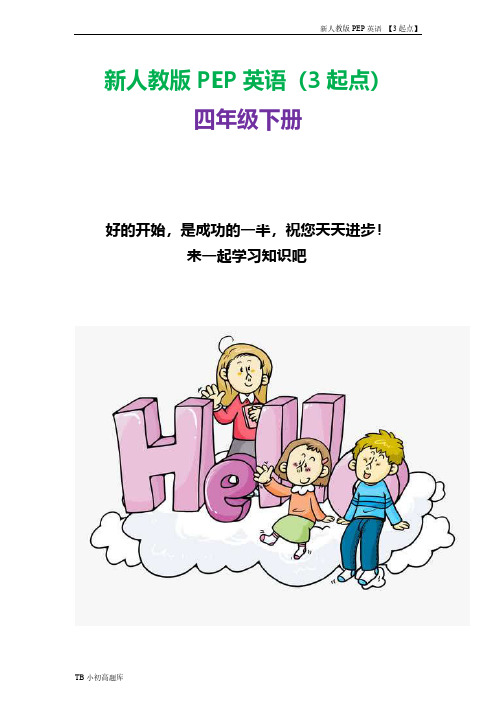
新人教版PEP英语(3起点)四年级下册好的开始,是成功的一半,祝您天天进步!来一起学习知识吧unit4 It is warm todaySecond LessonLet’s talk Let’s chant一、Warm-up : Enjoy “Let’s chant” twice .二、Review :1. Sharp eyes( Words : weather cold warm cool hot jacket sweater skirt dress shirt T-shirt )2. Students try to make a weather report by a map in pairs.三、Presentation :1. 学生作天气预报后,由地图引出某些地方的风景和天气情况,师站在一幅北京的图片旁:It’s warm today. I can wear my shirt today. …(移动课件中的地方作为情景) Let me go to Hong Kong. … Phew! It’s hot today. I can wear my skirt and T-shirt today. … Let me go to Lhasa . Ooooh! Can I wear my dress today ? 引导学生回答:Yes, you can. \ No, you can’t. It’s cool today.2. 板书并教读:Can I wear my … today ?Yes, you can. / No, you can. It’s ... today.3. Pair work:在PPT的图片中提供场景,让学生根据不同的环境来进行同桌问答。
4.引入对话T : Mike has a new shirt. Look at the pictures. ( Show out the 3 teaching pictures on the board .)Yes. \ No. Yes. \ No. Yes. \ No.cold \ hot \ war cold \ hot \ warm cold \ hot \ warm-----------------------------------------------------------------------------------------T : Can Mike wear the new shirt on the first day ?Can Mike wear the new shirt on the second day ?Can Mike wear the new shirt on the third day ?Let’s listen to the tape and circle the words under the pictures.5. Listen again and check the answers.6. Ss read follow the tape and then read together.7. Ss read in pairs.8. Role play the dialogue in pairs.五、Consolidation and extension:1. 课件播放一些地方的天气情况的相关录像,老师引导学生根据地方的天气进行情景对话。
最新精选新版-牛津上海版小学英语四年级下册复习巩固第六篇
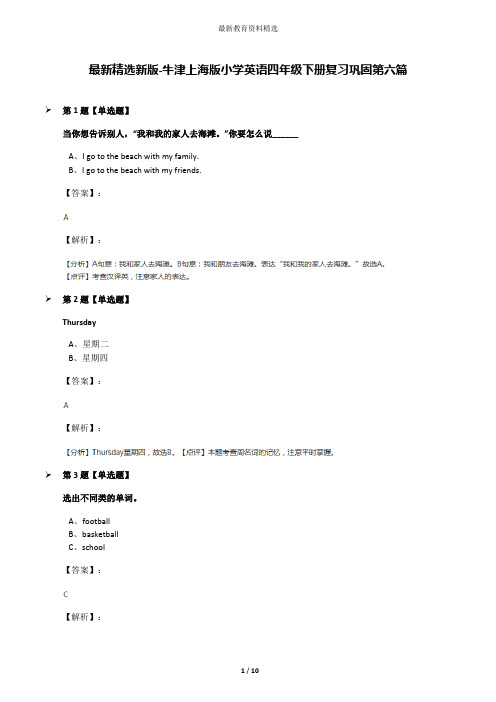
最新精选新版-牛津上海版小学英语四年级下册复习巩固第六篇第1题【单选题】当你想告诉别人,“我和我的家人去海滩。
”你要怎么说______A、I go to the beach with my family.B、I go to the beach with my friends.【答案】:【解析】:第2题【单选题】ThursdayA、星期二B、星期四【答案】:【解析】:第3题【单选题】选出不同类的单词。
A、footballB、basketballC、school【答案】:【解析】:第4题【单选题】选出不同类的单词。
A、MarchB、DecemberC、Wednesday【答案】:【解析】:第5题【单选题】They start ______.A、workB、to workC、works【答案】:【解析】:第6题【单选题】Tim is not late school.A、forB、aboutC、on【答案】:【解析】:第7题【单选题】Here"s a photo ____ my family.A、toB、ofC、in【答案】:【解析】:第8题【单选题】What time ______ it?( )A、amB、isC、are【答案】:【解析】:第9题【填空题】John______【答案】:【解析】:第10题【填空题】Teddy______ 【答案】:【解析】:第11题【填空题】Tell me ______ your New Year.【答案】:【解析】:第12题【填空题】teeth的单数形式是______.【答案】:【解析】:第13题【阅读理解】根据短文内容,根据图片写出对应的时间,用数字表示。
This is Lily"s day. She gets up early in themorning. She brushes her teeth at a quarter past seven. Then she has breakfastat a quarter to eight. She plays with her beautiful ball at half past ten. Shelikes drawing. She draws a picture at two o’clock in the afternoon. She likesreading. She reads a book at four o"clock in the afternoon.______________________________【答案】:【解析】:第14题【句型转换】读句子并按要求改写。
(沪教牛津版)四年级英语下册教案 Module1 Unit4 第一课
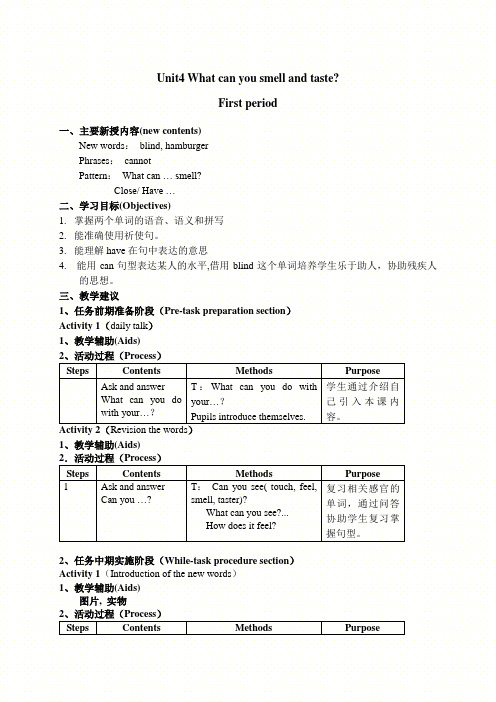
Unit4 What can you smell and taste?First period一、主要新授内容(new contents)New words:blind, hamburgerPhrases:cannotPattern:What can … smell?Close/ Have …二、学习目标(Objectives)1.掌握两个单词的语音、语义和拼写2.能准确使用祈使句。
3.能理解have在句中表达的意思4. 能用can句型表达某人的水平,借用blind这个单词培养学生乐于助人,协助残疾人的思想。
三、教学建议1、任务前期准备阶段(Pre-task preparation section)Activity 1(daily talk)1、教学辅助(Aids)2、活动过程(Process)Steps Contents Methods PurposeAsk and answer What can you do with your…?T:What can you do withyour…?Pupils introduce themselves.学生通过介绍自己引入本课内容。
Activity 2(Revision the words )1、教学辅助(Aids)2.活动过程(Process)Steps Contents Methods Purpose1 Ask and answerCan you …?T:Can you see( touch, feel,smell, taster)?What can you see?...How does it feel?复习相关感官的单词,通过问答协助学生复习掌握句型。
2、任务中期实施阶段(While-task procedure section)Activity 1(Introduction of the new words)1、教学辅助(Aids)图片, 实物2、活动过程(Process)Steps Contents Methods Purpose1 blindcannot 1. T:Close your eyes,children. Can you see?(No)Game:Draw a happy face onthe blackboard.(Close theeyes)2. (Show pictures)Look, this is Ben’s friend, hecannot see. He’s blind.Pupils follow.cannot blindT: Can you see? Are youblind?2. Ask and answerT: What can David do?What can’t David do?通过简短的游戏体验、借助人物图片及简单的语句使学生理解单词blind的含义。
牛津沪教版小学英语四年级下册知识点总结
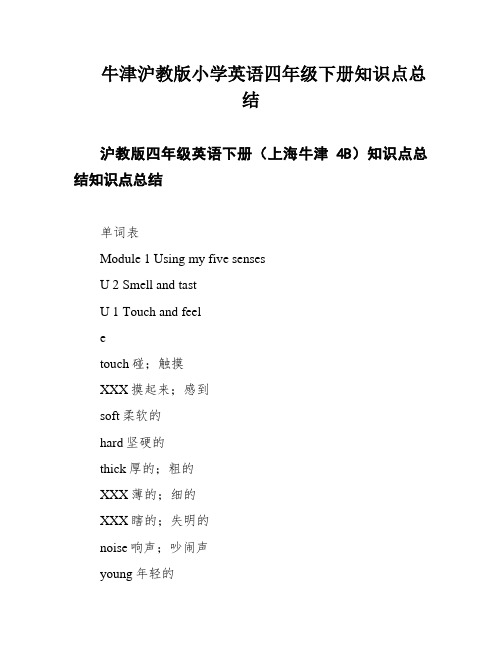
牛津沪教版小学英语四年级下册知识点总结沪教版四年级英语下册(上海牛津4B)知识点总结知识点总结单词表Module 1 Using my five sensesU 2 Smell and tastU 1 Touch and feeletouch碰;触摸XXX摸起来;感到soft柔软的hard坚硬的thick厚的;粗的XXX薄的;细的XXX瞎的;失明的noise响声;吵闹声young年轻的U 3 Look and see smell闻;嗅strawberry草莓or或者;还是watermelo n西瓜grape葡萄fox狐狸rou nd圆的purple紫色的wait等待;等候mi nute—会儿;分钟rise升起shadow影子noon中午high高的sky天空eve ning薄暮;早晨XXX再;又night夜晚moon玉轮him他stop停下XXX在中午get得到those那些go down落卜XXX在夜晚take a walk漫步Module 2 My favourite U 4 Subjectssubject学科;科目less on课Chi nese(学科)语文Maths(学科)数学En glish(学科)英语XXX(学科)科学PE(学科)体育Music(学科)音乐Art(学科)美术U5 Sportsport体育活动football足球XXX;兴趣小组XXX加入;插手tell通知about关于basketball篮球volleyball排球us我们table tennis乒乓球运动from从;来自play football踢足球XXXU 6 Musicwon XXX使人愉快的violin小提琴guitar吉他whose谁的piano钢琴city城市bag袋子gold金子all全部;所以timetable课程表;时间表play the violin拉小提琴play XXX弹吉他a.m.上午play basketball球打篮p.m.下午break苏息play volleyball打排球from…to…从…至到…Module 3 My colourfulUnit 7 My daylifeUn it 9 A frie ndinUnit 8 Days of the weeko'clock…点钟XXX一刻钟time工夫half—半wash洗dinner晚餐;正餐start入手下手catch捉住get up起床XXX…XXX刷牙have breakfast吃早餐go to school去上学wash…face洗脸have lu XXX吃午饭AustraliaChina中国XXX说话May五月XXX六月XXXXXX二月March三月April四月XXXXXX八月XXX九月October十月XXX■月XXXemail电子邮件hat帽子week礼拜XXX星期一XXX礼拜二Wed XXX星期三XXXXXX星期五game游戏XXX星期六Sun day星期日clock时钟;钟play chess下国际象棋at XXX在周末(be) late for迟到have XXX吃晚饭go to bed上床睡觉wear穿;戴XXX你的;你们的every year每年Module 4 XXXUnit 12 The ugly dUnit 10 My gardenUnit 11 Children's day uckli nggarde n花园plant植物leaf叶子water给....浇水them他们;她们;它们grow生长;成长song歌曲zoo动物园XXXXXXalso也;还have a party举办聚会ugly丑的;貌寝的duckli ng小鸭duck鸭子river江;河baby宝宝later厥后;当前quack(鸭啼声)嘎嘎seed种子every day每天back背;背部XXX去别处swan天鹅into朝;向;至U••…里面语法复1.量词的用法There is a glass of water melon juice. There are three glass es of strawberry juice.2.挑选疑问句和普通疑问句的区分(1)疑问句的回覆一般疑问句Is the kite red and blue?(这风筝是蓝红色的吗?)一般必须Yes或No开头Yes, it is./No, it isn't.⑵选择疑问句Is the XXX blue?(这风筝是蓝色还是红色?)挑选疑问句的回覆必需是二选一:It's re或. It's blue.3.关于like背面接分歧的名词和动词like apples / like gree n oneslike the apple / like the gree n onelike jellylike dancin g=like todance(不成数名(可数名词复数)词)(动词)(可数名词单数)would like to dance(would like to do=wa nttodo)be like me/her/his XXX(解释为像,作介词)4.感叹句What nice grapes!(复数)What a nice girl!(单数)5.whose对一切格发问Whose bag is this?——It'XXX回答用it')sXXX ?——They are his knives.答用th ey')(XXX回6.so和too解释为如此、太时后面跟形容词It's so thick. /He is so puzzled.It's too noisy.7.How+助动词+主语+动词XXX pin XXX.(戈U线提问)How does the pin eapple feel?XXX.(划线提问)How does this cherry taste?8.祈使句和can句型永远用动词原形,即使有祈使句Let'make a card now.now,也不克不及是举行时Kitty, don't put your book on the floor.(否认句在动词前加don')tcan句型Can Lucy read the book now?(容易犯的错误:看见XXX一个人就用三单行时)reads,或瞥见now用进9.There be就近准绳,背面所接词必需看清是不是是可数名词从而肯定词Thereis a cat and two dogs.XXX.XXX .XXX some paper rabbits .XXX some XXX .XXX .be动(离得近的是单数)(离得近的是复数)(不可数),(前面有修饰的名词复数)(单复数不异)(不可数)(前面有修饰的不可数)XXX a lot of apple一juice .10. both和all放在be动词之后,do动词之前XXX.They are all bli nd.We both run fast.XXX all touch the XXX.(be动词之后)(be动词之后)(do动词之前)(do动词之前)11. one of the复数,谓语三单One of the boy s is Tom.say s one of the brother s12.一般时和进行时的区别进行时:当句子里有标志性的词如now,look,listen,it'几点(祈使句和can句型除外),或是某个有上下情景的句子表示这个动作现在正在发生,结构be+do ingListe n, birds are singingWhere' s Sam? He is XXX.一般时:当句子里有标志性的词如every morning, on Moday, at weede nds,always, usually, ofte n, sometimes ,n ever, at陈述某个事实。
沪教牛津版英语四年级下册《MODULE1UNIT1(3)》课件
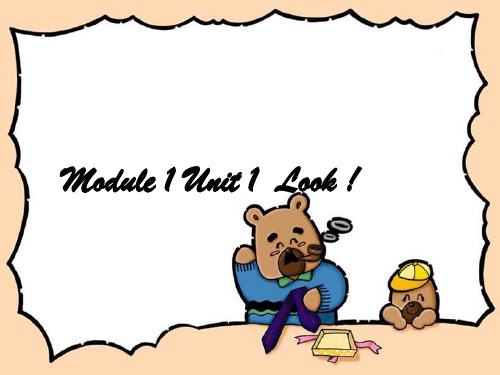
Summary
A
重点
现在进行时时态的构成与用法
I am reading a book.
B
this 与that 的区别
难点
these与those的区别
It’s time to… (提醒别人做某事) Let’s … (邀请别人一起做某事) You can…. (允许别人做某事) Shall we …? (提出建议)
Review the antonyms
反义词
thin → thick → fat
old → new → young
short → long → tall
Whose …is this/that? Whose … are these/ those? It is 人名’s …. They are 人名’s ….
4. go →
play →
5. write →
have →
6. stop →
run →
Have a test(检测
)
What is he doing?
What is he doing?
He is playing the guitar.(弹吉他)hat is she doing?
She is playing the violin.
Ben
Peter
重点:时态
现在进行时
★ 现在进行时的构成:
am/is/are + 动词的现在分词(ing)
★现在进行时的用法: 表示现在正在进行或发生的动作,常与 now(现在)连用。
动词变化规则:
1. 一般在词尾加ing
2. 2. 以不发音的e结尾的动词去e加ing
3. 3. 以重读闭音节结尾,词尾为元音+辅音结尾 的动词双写最后辅音字母再加ing
“牛津上海版”小学英语四年级(下)知识点大全
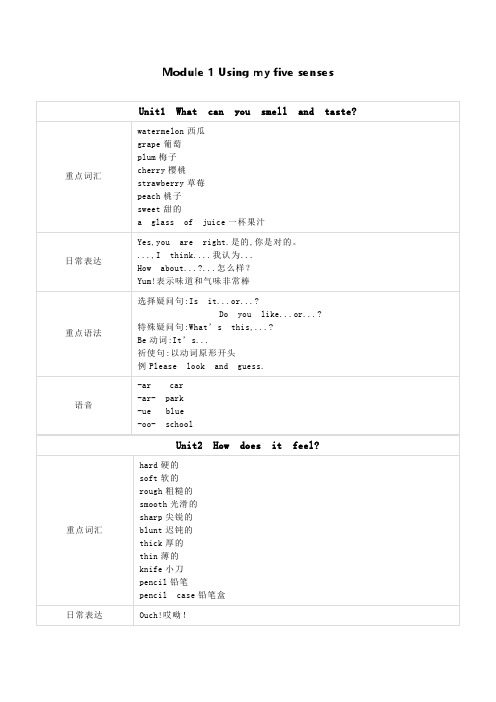
Unit1 A music class
piano 钢琴 violin 小提琴 triangle 三角铁 drum 鼓 music 音乐
特殊疑问句:What can you Whose...is it? Where’s...? 一般疑问句:Is that...?
play?
Unit2 Festivals in China
is sits
What time is it?几点了? It’s so much fun.好有趣。 It’s time for...到做...的时间了 All right.好的。
特殊疑问句:What are you doing? What time is it?
语音
重点词汇
重点语法 语音
关于时间的表达:例 seven o'clock, a quarter past seven, half past seven, a quarter to eight
频率副词:always,usually,often... 一般现在时:例 Peter goes to school from Monday to Friday. 介词:on
-ay May -ai- wait
重点词汇 重点语法
重点词汇 日常表达 重点语法
重点词汇
Module 4 More things to learn
the Spring Festival 春节 the Dragon Boat Festival 端午节 the Mid-autumn Festival 中秋节 the Double Ninth Festival 寒食节 festival 节日 rice dumpling 粽子 dragon boat races 龙舟赛 climb mountains 爬山 visit old people 看望老人
四年级英语下册Module4知识梳理(牛津上海版试用本)

M4U1 A Music class知识梳理一、重点词汇(需背默):piano钢琴、violin小提琴、triangle三角铁,三角形、drum鼓、piper吹笛人、full满的,饱的、gold金子、city城市、happen发生、return返回、rubber bands 通常、musical音乐的、instrument器具二、重点词组(需背默):play the piano 弹钢琴、play the violin 拉小提琴、play the triangle敲三角铁、play the drum敲鼓、a guessing game一个猜谜游戏、be full of充满了…、e to do sth. 来做某事、play beautiful music 演奏出美妙的音乐、walk away from the city 从城市中走开、give sb. sth. 给某人某位=give sth. to sb. 、go back home回家、a bag of gold 一包金子、in return回报、musical instrument乐器、Music class 音乐课、music room音乐教室三、重点句型(需背默):What happens? 发生了什么?四、语法知识:反义词:full饱的hungry 饿的full 满的empty 空的M4U2 Festivals in China知识梳理二、重点词汇(需背默):the Spring Festival春节、the Dragon Boat Festival端午节、the Midautumn Festival中秋节、the Double Ninth Festival重阳节、New Year’s Day元旦、New Year’s Eve 除夕、festival节日、during在…期间、relative亲戚、dumpling 饺子、rice dumpling粽子、sweet dumpling汤圆、which哪一个、grade年级、learn学习、important重要的、traditional传统的、money钱、envelope信封、firework烟花、restaurant饭店、race比赛、special特殊的、lantern灯笼、manner 礼仪、chopsticks筷子、fork叉子、blow吹、bubble泡泡、polite礼貌的二、重点词组(需背默):festivals in China=Chinese festivals 中国的节日、visit relatives拜访亲戚、Class3 Grade 4四年级三班、old people’s home敬老院、learn doing sth.学习做某事、an important festival一个重要的节日、e in January or February在一月或二月来到、buy new clothes买新衣服、traditional food 传统食物、have a big dinner 吃一顿丰盛的晚餐、red envelope 红包、watch colourful fireworks看彩色的烟花、at night在晚上、watch dragon boat races看龙舟比赛、eat rice dumplings 吃粽子、look at the beautiful moon 看美丽的月亮、eat mooncakes 吃月饼、eat Double Ninth cakes 吃重阳糕、table manners 饭桌礼仪、blow bubbles 吹泡泡三、重点句型(需背默):1. When is the Spring Festival? It is in January or February.春节在什么时候?它在一月或二月。
牛津版四年级下册英语知识点总结归纳-最新
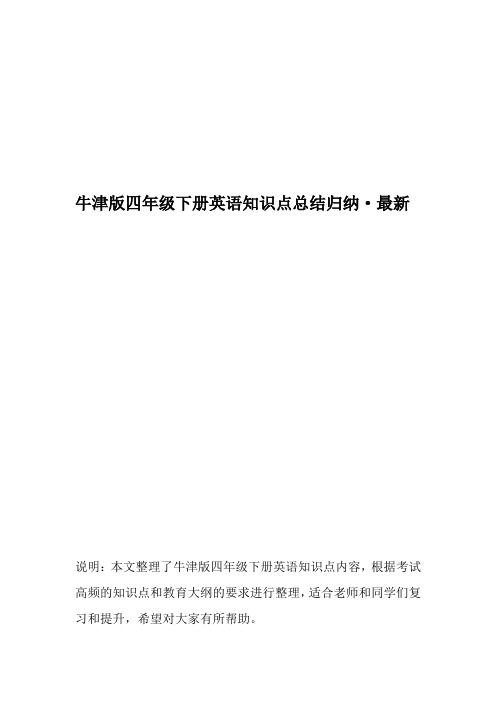
牛津版四年级下册英语知识点总结归纳·最新说明:本文整理了牛津版四年级下册英语知识点内容,根据考试高频的知识点和教育大纲的要求进行整理,适合老师和同学们复习和提升,希望对大家有所帮助。
目录Unit 1 Our school subjects (4)1、语音 (4)2、单词 (4)3、词组 (4)4、句型 (4)5、语法 (5)6、拓展 (5)Unit 2 After school (6)1、语音 (6)2、单词 (6)3、词组 (6)4、句型 (6)5、语法 (6)6、拓展 (7)Unit 3 My day (8)1、语音 (8)2、单词 (8)3、词组 (8)4、句型 (8)5、语法 (8)6、拓展 (8)Unit 4 Drawing in the park (10)1、语音 (10)2、单词 (10)3、词组 (10)4、句型 (10)5、语法 (11)6、拓展 (11)Unit 5 Seasons (12)1、语音 (12)2、单词 (12)3、词组 (12)4、句型 (12)5、语法 (12)6、拓展 (12)Unit 6 Whose dress is this? (14)1、语音 (14)2、单词 (14)3、词组 (14)4、句型 (14)5、语法 (14)6、拓展 (15)Unit 7 What’s the matter? (16)1、语音 (16)2、单词 (16)3、词组 (16)4、句型 (16)5、语法 (16)6、拓展 (16)Unit 8 How are you? (18)1、语音 (18)2、单词 (18)3、词组 (18)4、句型 (18)5、语法 (18)6、拓展 (19)Unit 1 Our school subjects1、语音字母a的读音/ eI / cake grape make skate2、单词1、school 学校 2. subject 课程 3. see 看见 4. Chinese 语文5. Maths 数学6. Music 音乐7. Art 美术8. lesson 课9. Monday 星期一 10.timetable 课程表 11. PE 体育12. Science 科学13. fun 乐趣,快乐 14. afternoon 下午 15. playground 操场3、词组1. our school subjects 我们的学校课程2. what subjects 什么课程3. like Chinese and Maths 喜欢语文和数学4. on Monday 在周一5. have an Art lesson 上一节美术课6. what about you 你呢7. go to the playground 去操场8. this afternoon 今天下午9. this morning 今天上午10. make a cake 做一个蛋糕11. what lessons 什么课12. go to 去13. our new timetable 我们的新课程表4、句型1. Welcome back to school. 欢迎回到学校。
小学英语牛津上海版教材(一年级起点)1---4年级 单词表
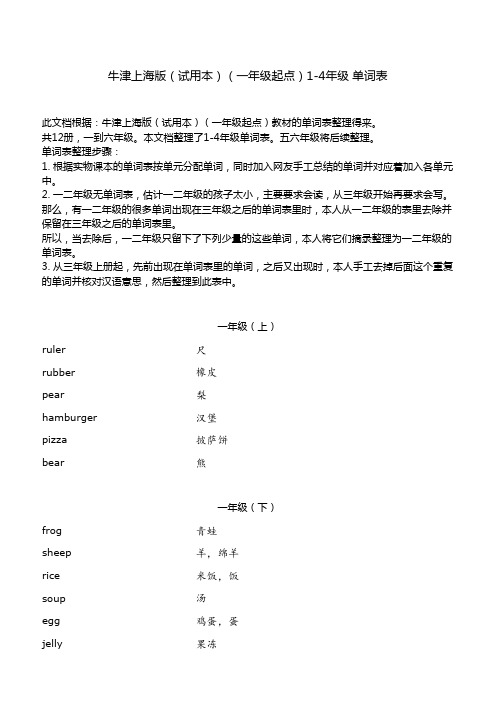
牛津上海版(试用本)(一年级起点)1-4年级 单词表此文档根据:牛津上海版(试用本)(一年级起点)教材的单词表整理得来。
共12册,一到六年级。
本文档整理了1-4年级单词表。
五六年级将后续整理。
单词表整理步骤:1. 根据实物课本的单词表按单元分配单词,同时加入网友手工总结的单词并对应着加入各单元中。
2. 一二年级无单词表,估计一二年级的孩子太小,主要要求会读,从三年级开始再要求会写。
那么,有一二年级的很多单词出现在三年级之后的单词表里时,本人从一二年级的表里去除并保留在三年级之后的单词表里。
所以,当去除后,一二年级只留下了下列少量的这些单词,本人将它们摘录整理为一二年级的单词表。
3. 从三年级上册起,先前出现在单词表里的单词,之后又出现时,本人手工去掉后面这个重复的单词并核对汉语意思,然后整理到此表中。
一年级(上)ruler尺rubber橡皮pear梨hamburger汉堡pizza披萨饼bear熊一年级(下)frog青蛙sheep羊,绵羊rice米饭,饭soup汤egg鸡蛋,蛋jelly果冻cola可乐gift礼物firecracker爆竹,鞭炮firework烟火,烟花farmer农民二年级(上)old年长的,老的young年轻的and seesaw跷跷板spoon调羹,勺子chopsticks筷子moon月亮fox狐狸hippo河马二年级(下)van箱式客货两用车ride a bicycle骑自行车salad沙拉,色拉carrot胡萝卜chicken鸡肉giraffe长颈鹿play ping-pong打乒乓play cards打牌letter信,信件carnation康乃馨milk牛奶三年级(上)Module 1 Unit 1a一;一个morning早上;上午after(时间)在……后afternoon下午evening傍晚;晚上night夜晚today今天I我you你we我们dad爸爸mum妈妈teacher教师boy男孩girl女孩Mr先生Mrs太太Miss小姐and和;与cut剪;切stick粘贴this这;这个(介绍时用)in在……里面have有;拥有new新的cake蛋糕colour给……涂色,颜色draw画画;绘画fine健康的table桌子too也;太;过于very非常;很well好;对Module 1 Unit 2my我的your你的name名字yes是的;对sit down坐下stand up起立what什么open打开the(表示特指)please请(表示客气、礼貌)write写;写字classroom教室clean把……擦干净;打扫;干净的blackboard黑板door门book书card卡片close关上fold折叠get拿;给……拿来hand手jam果酱look at看……Module 1 Unit 3here这里;在这里he他she她it它no不是one一two二three三four四five五six六seven七eight八nine九ten十bird鸟birthday生日party聚会yummy美味的only只;仅仅guess猜blow吹Module 2 Unit 1who谁but但是sing唱歌swim游泳football足球play football踢足球ride骑(车)can能;能够baby婴儿friend朋友pen钢笔;圈;畜栏;围栏tall高的short矮的;短的fat胖的thin瘦的;细的;薄的Module 2 Unit 2family家庭me我father父亲mother母亲brother哥;弟sister姐;妹grandfather(外)祖父;爷爷;外公grandmother(外)祖母;奶奶;外婆good好的look看eat吃come in进来like喜欢;像picture照片;图画bicycle自行车kite风筝Module 2 Unit 3red红色;红色的brown棕色;咖啡色;棕色的pink粉红色;粉红色的big大的small小的little小的long长的hair头发ear耳朵eye眼睛nose鼻子mouth口;嘴巴animal动物cat猫dog狗mouse老鼠rabbit兔子pig猪tail尾巴Module 3 Unit 1where(在)哪里there在那里that那;那个our我们的read阅读;读library图书馆photo照片hall礼堂nice好看的;美好的rose玫瑰花dance跳舞school学校playground操场play basketball打篮球toilet厕所Module 3 Unit 2an一;一个apple苹果banana香蕉orange橘子;橙子;橙红色的;橘黄色的peach桃子ice cream冰淇淋at在(某处)go去;走to到;去sure(表示同意)当然;一定wow(表示惊奇)哇;呀shop商店shopping购物单supermarket超市buy买how much多少(钱)how many多少(个)some一些many许多的ball球toy玩具may可以happy快乐的put放Module 3 Unit 3pupil小学生see看见flower花;花朵ballnoon气球white白色;白色的black黑色;黑色的green绿色;绿色的blue蓝色;蓝色的yellow黄色;黄色的purple紫色;紫色的park公园boat小船tube试管Module 4 Unit 1day一天;一日sun太阳beautiful漂亮的insect昆虫ant蚂蚁ladybird瓢虫bee蜜蜂butterfly蝴蝶fly飞duck鸭子Module 4 Unit 2face脸;面孔they他们put on穿上;戴上shoe鞋子hot炎热的;热的dream梦end结束count数farm农场gate大门chick小鸡hen母鸡Module 4 Unit 3cool凉爽的;酷的;妙极的rainy下雨的;多雨的sunny晴朗的warm温暖的;暖和的wet湿的now现在sad悲伤的;难过的tune曲调feel感觉box盒子under在……下面bud芽root根leaf (leaves)叶子trunk树干branch树枝grow生长;变得seed种子sunflower向日葵plant植物;种植三年级(下)Module 1 Unit 1them他们;它们children儿童;小孩(复数)by在……旁边car小汽车;轿车bus公共汽车aeroplane飞机ship(大)船;舰hear听见listen听window窗;窗户chair椅子else其他的;别的Module 1 Unit 2do(助动词)does(助动词)on在……上how怎样;如何;多么bag包food食物bread面包pie果馅饼;馅饼pineapple菠萝hungry饿的glass玻璃杯;玻璃hard硬的rough粗糙的smooth平滑的;光滑的soft柔软的touch触摸;碰(the) Moon月球;月亮yuan(人民币)元Module 1 Unit 3help帮助fruit水果lemon柠檬sweet糖果;甜的bitter苦的coffee咖啡salty咸的sour酸的salt盐smell闻;有……气味taste尝;有……味道whale鲸鱼Module 2 Unit 1into到……里面tiger老虎elephant大象lion狮子monkey猴子panda熊猫jump跳strong强壮的angry生气的clever聪明的has有;拥有(第三人称单数)so那么;如此;太take拿;获得;乘坐;拍照take a rest休息tree树rock岩石summer夏天hat帽子finally最后;终于clock钟uncle叔;舅;姨父;姑父Module 2 Unit 2walk行走;走;多行together一起play玩fun乐趣;有趣的lovely可爱的doll玩具娃娃train火车toy train玩具火车super超级的robot机器人skateboard滑板wall墙Module 2 Unit 3his他的these这些those那些great好极的clothes衣服jacket夹克衫glove手套scarf围巾sock短袜trousers裤子pair一双;一对a pair of一双;一对a pair of gloves一副手套a pair of socks一双袜子a pair of shoes一双鞋子word单词English英语make做;使;让;制造horse马zebra斑马Module 3 Unit 1house房子home到家;在家;家take off脱下(衣服)turn off关掉(灯、煤气、开关等))shape形状rectangle长方形;矩形square正方形circle圆形triangle三角形;三角铁star(五角)星形;星星Module 3 Unit 2sleep睡觉busy忙碌的sky天空sea海river河流mountain山outside在外面;在……外面autumn秋天spring春天winter冬天cold冷的snow雪grass草;草地grasshopper蚱蜢Module 3 Unit 3season季节picnic野餐have a picnic野餐ice-skate滑冰ski滑雪beach海滩sandcastle沙堡slowly缓慢地plant a tree种树Module 4 Unit 1body身体;躯干head头arm手臂shoulder肩膀finger手指leg腿knee膝盖foot脚feet脚(复数)easy简单的;容易的funny有趣的;滑稽的myself我自己yourself你自己Module 4 Unit 2first第一second第二third第三fifth第五fourteenth第十四class班级parent父亲(或母亲)with和……一起zoo动物园cinema电影院Children’s Day儿童节China中国Singapore新加坡Thailand泰国(the) UK英国Japan日本for给;对;为song歌曲photograph照片take a photograph拍照Module 4 Unit 3own自己的afraid害怕的bad坏的over there在那里time时间;时光water水boil煮沸wolf狼stop停止;停下story故事go away离开go fishing去钓鱼四年级(上)Module 1 Unit 1classmate同学student学生desk课桌sit坐her她的;她(宾格)eleven十一twelve十二thirteen十三fourteen十四fifteen十五sixteen十六every每一个number号码near在……附近;靠近live居住meet遇见mask面具skip跳绳Module 1 Unit 2paint用颜料画画everyone每人;大家both两个都guest嘉宾;客人interview访问;采访welcome欢迎fast快;快速dolphin海豚wasp黄蜂high高;高的;在高处hop单脚跳行climb爬,攀登,登上run跑;跑步swin游泳crisp薯片Module 1 Unit 3bright明亮的dry干燥的thirsty口渴的tired累的;疲倦的then那么;既然如此;那时back回来;向后;朝后full饱的biscuit饼干toast烤面包片drink喝bottle瓶;瓶子each other互相idea主意postman邮递员pebble砾石;鹅卵石lamp post跳灯柱crow乌鸦Module 2 Unit 1aunt姑母;姨母;舅母;婶婶Cousin表兄妹;堂兄妹man男子police officer警察right对的;正确的cloud云garden花园fish鱼dive跳水dish碟子wash洗mooncake月饼riddle谜语sometimes有时Module 2 Unit 2people人们job工作doctor医生nurse护士cook厨师;烹饪driver驾驶员bus driver公交车司机fire engine消防车firefighter消防员fire station消防站police station警察局princess公主dress裙子fire火dangerous危险的corner街角;拐角Module 2 Unit 3tooth牙齿bite咬coat外套shirt衬衫T-shirt T恤衫blouse 女式衬衣sweater毛衣;线衣jeans牛仔裤shorts短裤skirt短裙grey灰色的net网skate滑板;滑冰sharp尖的;锋利的Module 3 Unit 1lunch午餐have lunch吃午餐canteen食堂cupboard橱柜tidy整洁的;整齐的building大楼;建筑物floor地板;楼层gym体育馆office办公室bookshelf书架computer lab电脑房computer电脑;计算机lesson课show ... around 带领(某人)参观in front of在前面behind在……后面a lot of许多forest森林grandpa(外)祖父;爷爷;外公think认为try尝试Module 3 Unit 2city城市centre中心between在……中间around在……周围next to紧邻;在近旁visit游览;参观;拜访way路;路线street街道road道路post office邮政局postcard明信片send寄(信等)restaurant餐馆bakery面包房hotel旅馆thing东西;物品watch手表;观看stay停留;待show给……看;展示;表演other其他的light灯;(灯)光;(交通)灯slide滑梯;滑滑梯snake蛇pleasure乐事swing秋千;摆动;摇动Module 3 Unit 3worry担心glasses眼镜noodle面条bowl碗a bowl of一碗……a bottle of一瓶……a packet of一包……a loaf of (bread)一条(面包)a bar of一块;一条a packet of sweets一包糖果a bowl of noodles一碗面条a bar of chocolate一块巧克力a packet of biscuits一包饼干a bottle of water一瓶水chocolate 巧克力magic有魔力的smoke烟section部分;部门mole鼹鼠spider蜘蛛Module 4 Unit 1feed喂养corn谷物hay干草meat肉pick采;摘cow母牛;奶牛rubbish垃圾litter乱扔(垃圾)bin垃圾箱throw扔stone石头Don’t litter不要乱扔垃圾Don’t walk on the grass不要在草地上走Don’t pick flowers不要摘花Don’t throw stones不要乱扔石头Module 4 Unit 2have a look看一看beside在……旁边camera照相机cap(有帽舌的)帽子far away距离远sketchbook写生簿;素描簿map地图pond池塘fountain喷泉aviary鸟舍Module 4 Unit 3come来tell告诉weather天气windy多风的cloudy多云的snowy下雪多的shine照耀fall掉落January一月february二月March三月April四月May五月June六月July七月August八月September九月October十月November十一月December十二月Christmas圣诞节year年subject主题always总是received收到;接到best wishes最好的祝愿make phone calls打电话e-mail电子邮件Australia澳大利亚path小径;小路why为什么四年级(下)Module 1 Unit 1watermelon西瓜grape葡萄vine葡萄藤plum李子;梅子strawberry草莓cherry樱桃a glass of一杯juice果汁yum(表示味道非常好)crunchy(指食物)爽脆的not … at all一点也不want想要Module 1 Unit 2all所有;全体whose谁的lost-property office失物招领处blunt钝的;不锋利的thick厚的;粗的blind盲的;看不见的purse(女式)钱包key钥匙another另一个something某物knife小刀;刀pencil铅笔pencil case铅笔袋;铅笔盒sand沙Module 1 Unit 3at noon在中午(the) sun太阳down向下;朝下;沿着rise升起;上升do down落下go down向下走away离开follow跟随wait等待also也again又;再hill小山;山丘deer鹿lawn草坪bench长椅tea茶tear眼泪shadow影子Module 2 Unit 1before在……之前ask问notice通知remember记得join加入;参加healthy健康的enjoy享爱……的乐趣club俱乐部poster海报warm-up准备活动exercise运动;训练活动sport体育运动play badminton打羽毛球play table tennis打乒乓球play volleyball打排球swimming goggles泳镜swimming pool游泳池swimsuit泳衣Module 2 Unit 2large大的cute可爱的catch逮住;抓住shake摇动;晃动cat food猫粮dog food狗粮bone骨头onto朝;向(表示朝某位 置运动)basket篮子;筐parrot鹦鹉tortoise乌龟goat山羊hole洞wake up醒来Module 2 Unit 3living room客厅bedroom卧室kitchen厨房bathroom卫生间watch TV看电视go swimming去游戏chat聊天homework作业bedtime就寝时间themselvers他们自己model plane飞机模型have a holiday度假fairy tale童话interesting有趣的dinner(中午或晚上吃的) 主餐;正餐noise噪音about关于Module 3 Unit 1sound声音bell铃;铃铛doorbell门铃ring响起铃声loud大声的;响亮的quiet轻声的;安静的noisy吵闹的unhappy不高兴的puzzled迷惑不解的awake醒着的doze打盹儿;小睡have a nap小睡careful当心;小心fly away飞走have a bath洗澡cry哭television (TV)电视week周;星期Module 3 Unit 2get up起床brush刷brush my teeth刷牙wash my face洗脸have breakfast吃早餐have dinner吃正餐;吃晚餐seven o'clock七点钟a quarter past seven七点十分half past seven七点半a quarter to eight七点四十五分from从……来all the way一路上;自始至终late迟到的start开始finish完成;做完cartoon动画片puzzle拼图游戏owl猫头鹰battery电池last night昨天晚上tomorrow明天sofa沙发Module 3 Unit 3smile微笑bow鞠躬shy害羞的kind友善的while然而usually通常often经常a little有点never从不have a good time玩得高兴in the middle of在……中间really确定;的确activity活动meeting会议Monday星期一Tuesday星期二Wednesday星期三Thursday星期四Friday星期五Saturday星期六Sunday星期日at weekends在周末Chinese chess象棋Module 4 Unit 1music音乐piano钢琴drum鼓violin小提琴piper吹笛子的人(be) full of充满……gold金子Module 4 Unit 2money钱red envelope红包New Year's Eve除夕festival节日the Spring Festival春节the Double Ninth Festival重阳节the Dragon Boot Festival端午节the Mid-autumn Festival中秋节traditional传统的important重要的dragon boat race龙舟赛rice dumpling粽子dumpling饺子;汤团fireworks烟花表演colourful色彩缤纷的during在……期间relative亲戚Module 4 Unit 3duckling小鸭子swan天鹅worm虫子nest巢;窝lonely孤独的ugly丑的heavy重的drive … away把……赶走fourth第四。
牛津上海版(三起)四年级下册英语素材Module 4 Things we enjoy知识清单

Module Things we enjoy一、核心词汇1. 植物名词: plant植物leaf叶子(复数 leaves)seed 种子2. 地点名词: garden花园zoo动物园cinema 电影院museum博物馆3. 名词: song歌曲duck 鸭子duckling小鸭river河;江baby宝宝;婴儿back背;背部swan天鹅4. 动词: water给……浇水grow (使)生长;成长5. 形容词: ugly丑的;丑陋的6. 副词: also也;还later后来;以后7. 代词: them它们;他们;她们8. 介词: into朝;向;到……里面away 去别处;朝另一个方向9. 拟声词: quack (鸭叫声)嘎嘎10. 短语: every day每天have a party 举办聚会二、拓展词汇1. 动词: skate 滑冰sing 唱歌dance跳舞2. 形容词: beautiful漂亮的yellow黄色的三、核心句型1. I have a garden. 我有一个花园。
解读:这是介绍某人有某物的句型。
举一反三: She has two beautiful hats. 她有两顶漂亮的帽子。
2. I like reading and listening to music in my garden. 我喜欢在我的花园里阅读和听音乐。
解读:这是介绍某人喜欢某物的句型。
举一反三: She likes ice-cream. 她喜欢冰激凌。
3. Our classroom looks beautiful. 我们的教室看起来很漂亮。
解读:这是介绍某物看起来怎么样的句型。
举一反三: The bananas look delicious. 香蕉看起来很美味。
4. Do you go to the park on Children’s Day? 儿童节那天你去公园吗?解读:这是询问某人在某天是否做某事的句型。
译林牛津版四年级英语下册全册知识点归纳及练习

Unit 1 Our school subjects一.单词school 学校subject 科目,学科see 看到,看见Chinese 语文Maths 数学Art 美术Music 音乐Monday 星期一lesson 课二.词组welcome back to…… 欢迎回到…… nice to see you 见到你很高兴what subject 什么课程new time table 新的时间表/课程表our new time table 我们的新的时间表/课程表like Chinese 喜欢语文It's time for……是做什么的时候到了go to 去……go to the playground 去操场this morning 今天上午this afternoon 今天下午new subject 新课程what day 星期几what lesson 什么课our school subject 我们学校的课程三.句型1. What subjects do you like? 你喜欢什么课程?I like Chinese and Maths.我喜欢语文和数学。
2. Let’s go to the library.让我们一起去图书馆。
(Let’s=Let us)3. What lessons do we have this morning? 我们今天上午有什么课?We have Music and PE.我们有音乐和体育。
4.Idon’t like PE and Music. 我不喜欢体育和音乐。
(do n’t=do not)5. It’s time for PE. 该上体育课了。
(for+名词)It’s time to go to school. (to+动词/动词词组)It’s time to play basketball. It’s time to have an Art lesson . It’s time to have Art .6. 区别lesson 和subjectWhat _______ do you have this afternoon? I have eight ________ this morning.What _______ do you have this term(学期)? I have eight ________ at school.What _______ do you like? I like English and Maths.How many_______do you have this turm ? Eight.四.发音Aa /ei/ cake 蛋糕grape 葡萄make 做skate 滑冰table 桌子name 名字plate 盘子take 拿,带wake 醒来baby 婴儿五.练习(一)、单项选择。
4年级英语下册牛津版核心语法知识点

四年级英语下册牛津版核心语法知识点一、名词在四年级英语下册牛津版中,名词是一个非常重要的语法知识点。
名词是用来表示人、事物、地点或抽象概念的词语。
在学习英语的过程中,名词的单数和复数形式、所有格以及不可数名词的用法都是需要重点掌握的内容。
1. 单数和复数形式在英语中,名词的单数形式和复数形式有着不同的变化规律。
有些名词在后面添加-s构成复数,有些名词要变换其拼写形式,有些名词则是不变的。
cat的复数形式是cats,而child的复数形式是children,而名词sheep的复数形式和单数形式相同。
2. 名词所有格名词的所有格表示所属关系。
在英语中,名词所有格的构成形式有所不同,主要分为添加-apostrophe和-s、只添加-apostrophe以及以-s结尾的名词直接添加-apostrophe等形式。
Tom的书可以表示为Tom's book,而复数名词的所有格形式为添加-apostrophe和-s,例如children的书可以表示为children's book。
3. 不可数名词的用法在四年级英语下册牛津版中,还介绍了不可数名词的用法。
不可数名词表示一类事物的总称,无复数形式,通常用来表示物质、液体、抽象概念等。
water、milk、rice等都属于不可数名词。
在句子中,不可数名词通常用来表示某种状态、特征、性质等。
二、动词动词是句子中最重要的成分,它可以表示行为、状态或动作的发生。
在四年级英语下册牛津版中,动词的时态、语态以及不同形式的用法是需要重点关注的语法知识点。
1. 动词的时态在英语中,动词的时态有着严谨的变化规律,分为一般现在时、一般过去时、一般将来时等。
学生需要掌握不同时态的构成形式和用法,以便能够准确地表达所要表达的时态含义。
2. 动词的语态动词的语态分为主动语态和被动语态。
主动语态表示主语是动作的执行者,而被动语态则表示主语是动作的承受者。
在四年级英语下册牛津版中,学生需要了解被动语态的构成和用法,并能够准确地进行句子转换。
上海英语词汇复习表(带音标) -4年级

上海英语单词复习表牛津小学英语四年级上册bring [briŋ]v.带来classmate ['klɑ:smeit]n.同学cook [kuk]v.烹调n.厨师cut [kʌt]v.切dear [diə]adj.亲爱的dentist ['dentist]n.牙科医生dive [daiv]v.跳水doctor [dɔktə]n.医生draw [drɔ:]v.画engine ['endʒin]n.引擎fire ['faiə]n.火fireman ['faiəmən]n.消防队员fly [flai]v.飞our ['auə]pron.我们的paint [peint]v.画policeman [pə'li:smən]n.警察policewoman [be'li:s,wumən]n.女警察shop assistant [ə'sistənt] n.营业员read [ri:d]v.阅读ride [raid]v.骑run [rʌn]v.跑sing [siŋ]v.唱swim [swim]v.游泳waiter [weitə]n.服务员waitress ['weitris]n.女服务员write [rait]v. 写angry ['æŋɡri]adj.发怒afraid [ə'freid]adj.害怕arm [a:m]n.手臂bell [bel]n.铃block [blɔk]n.大楼branch [brɑ:ntʃ]n.树枝brave [breiv]adj.勇敢的face [feis]n.脸finger ['fiŋɡə]n.手指foot [fut]n.脚full [ful]adj.饱的knee [ni:]n.膝盖round [raund]adj.圆的sharp [ʃɑ:p]adj.尖的shoulder ['ʃəuldə]n.肩strong [strɔŋ]adj.强壮的tired ['taiəd]adj.累的toe [təu]n.脚趾whose [hu:z]pron.谁的I'm...years old. 我……岁。
2023四年级英语下册Unit4Drawinginthepark知识点梳理素材译林牛津版

Unit 4知识点总结一、重点单词drawing/draw画画park 公园 flower花,花朵 them他们;她们;它们(宾格)difficult 难的,困难的try 试hill小山,山丘again再一次,又一次boat小船river河;江 lake 湖泊,湖二、核心词组in the park在公园里draw some pictures画一些图画good idea好主意draw them画它们over there在那边some flowers一些花well done干得好on the river在河上make a cake做个蛋糕in this big box在这个大盒子里have a look看一看great fun很有趣try again再试一次on the lake在湖面上ten to ten 9点50before ten在十点之前三、重点句型1.Let’s draw some pictures here.让我们在这儿画一些画吧。
2.What can you see over there?在那儿你能看见什么?I can see a tree and some flowers.我能看见一棵树和一些花。
3.Can you draw them?你能画它们吗?4.Can you see the boat on the river?你能看见河面上的船吗?5.It’s difficult,but I can try.它很难,但是我能试试。
6.What’s in this big box?这个大盒子里有什么?7.It’s great fun.它很有趣。
四、语法知识1.情态动词can(1)、情态动词,表示“能够、可能”,后面必须加动词原型例如:I can swim very well.(2)、I/ You/ He/ She/ It / We/ You/ They,所有人称都用can,不分单复数陈述句:以句号结尾,句中没有not。
2021上海版牛津英语四年级下册各单元知识点总结

2021上海版牛津英语四年级下册各单元知识点总结最新上海版牛津英语四年级下册各单元知识点总结Module 1Using my five senses一、核心词汇1.水果名词:strawberry草莓watermelon西瓜grape葡萄2.时间名词:noon中午evening傍晚;晚上night夜晚minute一会儿;分钟3.名词:noise响声;吵闹声fox狐狸shadow影子moon 月亮sky天空4.感官动词:touch碰;触摸feel摸起来;感到smell闻;嗅5.动词:wait等待;等候get得到rise升起stop停下6.形容词:soft柔软的hard坚硬的thick厚的;粗的thin 薄的;细的blind瞎的;失明的young年轻的round圆的purple紫色的high高的7.副词:again再;又8.代词:those那些him他9.连词:or大概;还是10.短语:XXX在正午go down落下XXX在夜晚take a walk漫步二、拓展词汇1.颜色名词:white白色black黑色red红色green绿色yellow黄色2.水果名词:apple苹果pear梨banana香蕉3.名词:sun太阳star星星4.动词:XXX瞥见XXX品尝hear听5.形容词:long长的short短的sweet甜的sour酸的old老的3、中心句型1.—How does it feel?感觉如何?—It’s soft.它是柔软的。
解读:这是询问对某物的触觉觉得的句型及其回答。
举一反三:—How do the apples feel?这些苹果你感觉如何?—They are hard.它们是硬的。
2.—What is it?它是什么?—It’X XX.它是一只玩具熊。
解读:这是询问物品名称的句型及其回答。
闻一知十:—What is it?它是什么?—It’s an apple.它是一个苹果。
3. Is it strawberry juice or watermelon juice?是草莓汁还是西瓜汁?解读:这是一个选择疑问句。
牛津上海版小学英语1-5年级英语牛津词汇表(带音标)
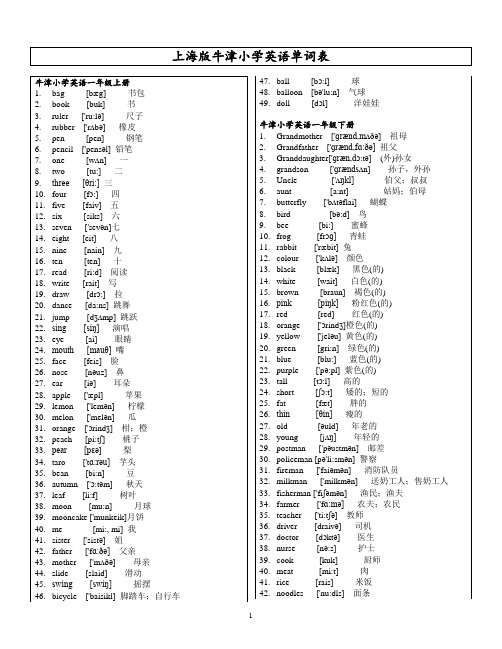
47.ball [bɔ:l] 球48.balloon [bə'lu:n] 气球49.doll [dɔl] 洋娃娃牛津小学英语一年级下册1.Grandmother ['ɡrænd,mʌðə] 祖母2.Grandfather ['ɡrænd,fɑ:ðə] 祖父3.Granddaughter['ɡræn,dɔ:tə] (外)孙女4.grandson ['ɡrændsʌn] 孙子,外孙5.Uncle ['ʌŋkl] 伯父;叔叔6.aunt [a:nt] 姑妈;伯母7.butterfly ['bʌtəflai] 蝴蝶8.bird [bə:d] 鸟9.bee [bi:] 蜜蜂10.frog [frɔɡ] 青蛙11.rabbit ['ræbit] 兔12.colour ['kʌlə] 颜色13.black [blæk] 黑色(的)14.white [wait] 白色(的)15.brown [braun] 褐色(的)16.pink [piŋk] 粉红色(的)17.red [red] 红色(的)18.orange ['ɔrindʒ]橙色(的)19.yellow ['jeləu] 黄色(的)20.green [gri:n] 绿色(的)21.blue [blu:] 蓝色(的)22.purple ['pə:pl] 紫色(的)23.tall [tɔ:l] 高的24.short [ʃɔ:t] 矮的;短的25.fat [fæt] 胖的26.thin [θin] 瘦的27.old [əuld] 年老的28.young [jʌŋ] 年轻的29.postman ['pəustmən] 邮差30.policeman [pə'li:smən] 警察31.fireman ['faiəmən] 消防队员kman ['milkmən] 送奶工人;售奶工人33.fisherman ['fiʃəmən] 渔民;渔夫34.farmer ['fɑ:mə] 农夫;农民35.teacher ['ti:tʃə] 教师36.driver [draivə] 司机37.doctor [dɔktə] 医生38.nurse [nə:s] 护士39.cook [kuk] 厨师40.meat [mi:t] 肉41.rice [rais] 米饭42.noodles ['nu:dls] 面条43.soup [su:p] 汤44.cake [keik] 蛋糕45.ice-cream 冰淇淋46.sweet [swi:t] 糖果47.jelly ['dʒeli] 果冻48.coke [kuk] 可乐牛津小学英语二年级上册1.bin [bin] 筒2.park [pa:k] 公园3.road [rəud] 道路4.building ['bildiŋ] 建筑物5.pizza ['pi:tsə] 比萨饼6.biscuit ['biskit] 饼干7.hotdog [hɔtdɔg] 热狗8.juice [dʒu:s] (果)汁、液9.water ['wɔ:tə] 水10.play [plei] 玩,玩耍11.run [rʌn] 跑12.sleep [sli:p] 睡觉13.swim [swim] 游泳14.plane [plein] 飞机15.ferry ['feri] 摆渡;渡船16.train [trein] 火车17.taxi ['tæksi] 出租车18.car [ka:] 汽车;小汽车19.bus [bʌs] 公共汽车20.van [væn] 有蓬货车21.stop [stɔp] 停止22.go [ɡəu] 去;走23.light [lait] 灯;光24.fast [fa:st] 快速的25.slow [sləu] 缓慢的26.in [in] 在……之内(里)27.on [ɔn] 在……之上28.under ['ʌndə] 在……之下29.bell [bel] 铃;钟30.star [sta:] 星;恒星31.present ['preznt]赠品;礼物32.tree [tri:] 树33.hat [hæt] 帽子34.glove [ɡlʌv] 手套35.scarf [ska:f] 围巾36.winter ['wintə] 冬季37.cold [kəuld] 寒冷38.wind [wind] 风39.snow [snəu] 雪40.tie [tai] 领带;带子41.belt [belt] 腰带42.sock [sɔk] 袜子43.shirt [ʃə:t] 衬衫44.dress [dres] 女服;童装45.coat [kəut] 外套牛津小学英语二年级下册1.hen [hen] 母鸡2.chick [tʃik] 小鸡3.duck [dʌk] 鸭子4.cow [kau] 母牛5.sheep [ʃi:p] 羊6.pig [pig] 猪7.horse [hɔ:s] 马8.bear [bεə] 熊9.elephant ['elifənt] 大象10.tiger ['taiɡə] 老虎11.monkey ['mʌŋki] 猴子12.panda ['pændə] 熊猫13.window ['windəu] 窗户14.door [dɔ:] 门15.bed [bed] 窗16.room [ru:m] 房间17.sofa ['səufə] 沙发18.table ['teibl] 桌子mp [læmp] 灯20.walk [wɔ:k] 步行;散步21.skip [skip] 跳跃22.swing [swiŋ] 秋千;摇摆23.climb [klaim] 攀登;爬24.fly [flai] 飞翔25.ride [raid] 骑;乘26.glass [gla:s] 玻璃;玻璃杯27.water ['wɔ:tə] 水28.soap [səup] 肥皂29.wash [wɔʃ] 洗30.dirty ['də:ti] 脏的31.towel ['tauəl] 手巾;毛巾32.toothbrush ['tu:θbrʌʃ] 牙刷33.Toothpaste ['tu:θpeist] 牙膏34.chopsticks ['tʃɔpstiks] 筷子35.bowl [bəul] 碗36.plate [pleit] 盘子37.spoon [spu:n] 勺子;匙38.fork [fɔ:k] 叉39.knife [naif] 刀40.summer ['sʌmə] 夏季41.sun [sʌn] 太阳42.cloud [klaud] 云43.hot [hɔt] 热的44.beach [bi:tʃ] 海滩45.shell [ʃel] 贝壳46.sand [sænd] 沙子47.watch [wɔtʃ] 手表48.clock [klɔk] 钟表49.day [dei] 白天50.night [nait] 夜晚51.breakfast ['brekfəst] 早餐牛津小学英语三年级上册te [leit] adj. 迟的2.very ['veri] adv.很3.again [ə'ɡen] adv.再4.no [nəu] interj.不5.yes [jes] interj.是6.please [pli:z] interj.请7.ruler ['ru:lə] n.尺8.window ['windəu] n.窗9.kite [kait] n.风筝10.dog [dɔɡ] n.狗11.jam [dʒæm] n.果酱12.box [bɔks] n.盒子13.ear [iə] n.耳朵14.mouse [maus] n.老鼠15.cat [kæt] n.猫16.door [dɔ:] n.门 [neim] n.名字18.girl [ɡə:l] n.女孩19.apple ['æpl] n.苹果20.pencil ['pensəl]n.铅笔21.lion ['laiən] n.狮子22.hand [hænd] n.手23.book [buk] n.书24.bag [bæɡ] n.书包25.desk [desk] n.书桌26.elephant ['elifənt] n.象27.rubber ['rʌbə] n.橡皮擦28.school [sku:l] n.学校29.clock [klɔk] n.钟30.you [ju:] pron.你,你们31.your [jɔ:] pron.你的,你们的32.what [hwɔt] pron.什么33.see [si:] v.看见34.clean [kli:n] v.把……弄干净35.close [kləuz] v.关36.open ['əupən] v.开37.look(at) v.看(着)38.are [a:] v.是39.Mrs ['misiz] 夫人40.Mr [mist] 先生41.Miss [mis] 小姐42.big [big] adj.大的43.long [lɔŋ] adj.长的44.short [ʃɔ:t] adj.短的45.tall [tɔ:l] adj.高的46.good [gud] adj.好的47.yellow ['jeləu] adj.黄色的48.sad [sæd] adj.沮丧的49.thin [θin] adj.瘦的50.little ['litl] adj.小的51.happy ['hæpi] adj.幸福的52.and [ænd] conj.和53.dad [dæd] n.爸爸54.mother ['mʌðə] n.妈妈55.cake [keik] n.蛋糕56.father ['fɑ:ðə] n.父亲57.x-ray ['eksrei]n.X光58.teacher ['ti:tʃə]n.教师59.sister ['sistə] n.姐妹60.brother ['brʌðə]n.兄弟61.boy [bɔi] n.男孩62.friend [frend] n.朋友63.umbrella [ʌm'brelə]n.伞64.sun [sʌn] n.太阳65.queen [kwi:n] n.王后66.tail [teil] n.尾巴67.rain [rein] n.雨68.small [smɔ:l] adj.小的69.with [wið] prep.和……一起70.in [in] prep.在……里71.who [hu:] pron.谁72.she [ʃi:] pron.她73.he [hi:] pron.他74.it [it] pron.它75.they [ðei] pron.他们76.am [æm] v.是77.is [iz] v.是78.me [mi:] pron.我(宾格)79.my [mai] pron.我的80.baby ['beibi]n.婴儿81.bow [bau] v.鞠躬,弯腰82.play [plei] v.玩83.like [laik] v.喜欢84.new [nju:] adj.新的85.up [ʌp] adv.向上86.down [daun] adv.向下87.office ['ɔfis] n.办公室88.flower ['flauə]n.花89.slide [slaid] n.滑梯90.classroom ['klɑ:srum] n.教室91.playground ['pleiɡraund]n.操场92.hall [hɔ:l] n.礼堂93.circle ['sə:kl] n.圈94.triangle ['traiæŋɡl]n.三角形95.tree [tri:] n.树96.sky [skai] n.天空97.library ['laibrəri]n.图书馆98.banana [bə'nɑ:nə] n.香蕉99.boat [bəut] n.小船100.star [sta:] n.星101.shape [ʃeip] n.形状102.chair [tʃεə] n.椅子103.cloud [klaud] n.云104.square [skwεə] n.正方形105.that [ðæt] pron.那106.this [ðis] pron.这107.stand [stænd] v.站(起) 108.sit [sit] v.坐(下) 109.sorry ['sɔ:ri] adj.抱歉的110.duck [dʌk] n.鸭111.fly [flai] n.苍蝇112.gate [geit] n.大门113.root [ru:t] n.根114.egg [eg] n.鸡蛋115.chick [tʃik] n.小鸡116.chicken ['tʃikin] n.鸡肉dybird ['leidibə:d]n.甲虫118.sandwich ['sænwidʒ] n.三明治119.sweet [swi:t] n.糖果120.head [hed] n.头121.leg [leg] n.腿122.shoe [ʃu:] n.鞋123.camera ['kæmərə]n.照相机124.plant [pla:nt] n.植物125.pig [pig] n.猪126.count [kaunt] v.数127.find [faind] v.找到128.has [hæz] v.有129.Excuse me. 对不起。
- 1、下载文档前请自行甄别文档内容的完整性,平台不提供额外的编辑、内容补充、找答案等附加服务。
- 2、"仅部分预览"的文档,不可在线预览部分如存在完整性等问题,可反馈申请退款(可完整预览的文档不适用该条件!)。
- 3、如文档侵犯您的权益,请联系客服反馈,我们会尽快为您处理(人工客服工作时间:9:00-18:30)。
四年级第二册知识点整理
M1:
watermelon grape plum cherry strawberry hard soft rough smooth sharp blunt thick thin skirt purse floor hill lawn path bench shadow take off put on something anything one of…not… at all
1.Is it cherry juice or watermelon juice? It’s cherry juice.
2.Do you like the red ones or green ones? I like the red ones.
3.What are these/ those? They are….
4.In summer we often sit around and enjoy a fruit.
5.Whose … is this/ that? It’s+ 名词所有格
6.Whose … are these/ those? They are +名词所有格
7.Danny, put your pencil in the bag. __否定__ Danny, don’t put your pencil in the bag.
8.How does it feel ? How do they feel?
9.There’s something in the sand . 一般疑问:Is there anything in the sand?
10.What’s the matter with you?
知识点:
1.需要掌握选择疑问句的格式以及回答。
2.在季节,月份前面都用介词in. 在周几,用on , 时间前面用at
3.需要掌握代词one, ones 的用法。
上文已经提过,下文,如果是单数one. . 复数ones
4.需要掌握疑问代词whose 的用法。
对某人的进行提问。
答句应该是某人的
5.知道名词所有格的用法。
6.注意动词三单的用法。
当人称是三单时,句子一般的动词也要用三单,一般在动词后
面+ s 或者es
M2:
play football play table tennis play volleyball play badminton play basketball talk with want to never always a swimming class a swimsuit bone cat food fish dog food parrot tortoise shake wake up run away bedroom living room bathroom kitchen sports favourite would like to get in go into enjoy yourself make you healthy jump off
a large bowl of …do one’s homework in the bathroom wash one’s hair/face brush one’s teeth make a model plane cook dinner turn off turn on have a look watch TV with my parents go swimming
1. Does Alice like playing football? Yes, she does. No, she doesn’t.
2. Who else would like to join?
3. What does she do?
4.. What animals / food do you like?
5. What food does a cat eat? It eats…
6.What are you doing? I am+动词ing
7. What is she doing? She is+动词ing
8. The Chens are having a holiday on the beach in Sanya.
知识点:
1.继续掌握动词三单形式的灵活运用。
2.现在进行时态:主语+be动词+动词的ing。
掌握几种不同的动词iing的转换。
3.play+体育项目。
Play + the +乐器
M3:
quite loud bell television(TV) get up brush one’s teeth have breakfast. wash one’s face o’clock quarter past to mouse mice go to school
week always usually often sometimes never Monday Tuesday Wednesday Thursday Friday Saturday Sunday in a week at weekends
from…to…在周几用on , go home have a time the days of the week be late finish doing sth so much fun different+名词复数
1.Are they playing basketball?
2. It’s noisy. (noise----- noisy)
3. What time is it?= What the time?
4. It’s a quarter to eight.
5. What do you usually do on Monday?
6. What does she always do at weekends?
知识点:
1.词组的固定搭配。
2.动词与人称的三单。
3. 时间的表示方法。
4. Sunday is the first day of a week.
M4:
piano violin triangle drum the Spring Festival the Dragon Boat Festival the Mid-autumn Festival the Double Ninth Festival talk about duckling swan nest ugly it’s time for beside be full of give sb sth= give sth to sb
what happens visit relatives rice dumplings which live in
an important festival January February March April May June July August September October November December 月份前面用in
one --- first two--- second three --- third four--- fourth five----- fifth hot sunny rainy cool dry
1.
2.It’s time for+名词== It’s time to +动词原形
3.
4.Where’s my drum? It’s beside the piano.
5.
6.What happens in the city ?
7.What festival do you like ? 5. Which Chinese festival do you like?。
